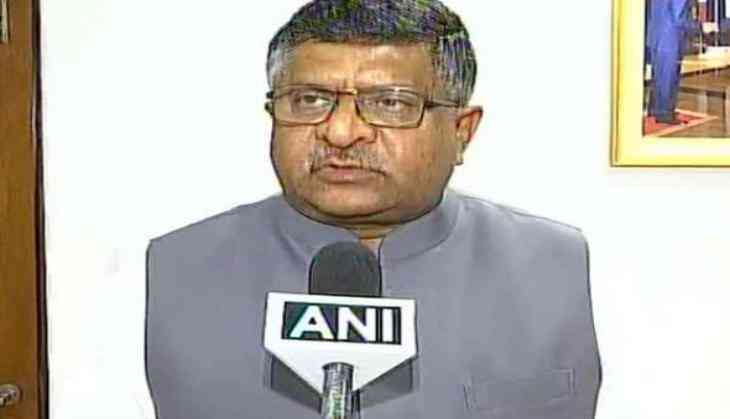
The mandatory linking of all bank accounts with Aadhar cards has been done by the government to check benami properties, fake accounts and corruption, said Ravi Shankar Prasad, Union Minister of Electronics and Information Technology and Law and Justice, on Tuesday.
Prasad said Aadhar card is safely encrypted and there is nothing to worry about the safety of personal information as it governed by laws passed by the Parliament and any violator would face strict punishment, ranging up to even seven-year imprisonment.
Prasad was speaking at the Ministerial panel of the CyFy2017, the fifth edition of the India conference on cyber security and internet, organised by Observer Research Foundation here today.
The minister described how linking of Aadhar and bank accounts have enabled government to empower the poor through direct benefit transfers (DBTs), avoiding middlemen, and disconnection of 30 million fake gas connections. "Digital governance is good governance," he remarked.
He said the digital world offered both opportunities and challenges and we should try to enforce laws to avoid accidents and abuses in the information highways as we do in the highways.
He said the world should not panic about the digital world, which is in fact a safe world, and instead all countries should work together to make it safe.
Prasad said he is seeing a huge surge in the digital economy with 5-6 startups daily and expected the digital economy to be around one trillion in less than five years.
He said while the Modi government came power, there were only two factories in India which manufactured mobile phones, but now there are more than 100 plants.
Delivering the keynote address, Mark Field, UK's Minister of State for Asia and the Pacific, Foreign and Commonwealth Office, said now cyber attacks have become a big global industry, which is worth more than 400 million.
Like Prasad, he also stressed the need for all countries to strengthen cooperation to make cyberspace safe and its security foolproof.
ORF Chairman Sunjoy Joshi underlined the need for providing digital access to all, especially poor, at an affordable price.
The two-day conference will see around 130 speakers, mostly from abroad, and cyber stakeholders address the fourth edition of the Cyfy, a regular and prominent feature in India's cyber discourse.
Former Prime Minister of Sweden and Special Representative, Global Commission on the Stability of Cyberspace, Mr Carl Bildt, former Minister of Foreign Affairs, the Netherlands, and Commissioner, Global Commission on the Stability of Cyberspace, Mr Uri Rosenthal, Mr Sanjay Kumar Verma, Additional Secretary, Ministry of External Affairs, Mr. Alex Stamos, chief security officer of Facebook, Mr. Colin Crowell, head of global public policy, Twitter, Mr. Rajiv Kumar, Vice Chairman, NITI Ayog, are some of the speakers at the sessions.
The keynote addresses will be delivered by Mr. Ajay Prakash Sawhney, Secretary in the Ministry of Electronics and Information Technology; Mr. Rajeev Chandrasekhar, Member of Parliament, and Mr Gulshan Rai, National Cybersecurity Coordinator, Prime Minister's Office.
The conference is having sessions on 'The big questions: Technology, security and society'; 'No man's LAN: The militarisation of cyberspace'; 'War and peace in the digital age'; 'Predatry data: Gender and tech'; 'Harvesting the cloud'; 'Blue, while and chrome: The future of work'; 'Chasing Unicorns: The startup generation'; 'Digital vulnerabilities: Capacity building for tracking cyber crime'; 'The new code war'; 'Command and CTRL: Emerging Regime on Lethal Autonomous Weapons'; 'Encryption: The end of surveillance?'; 'Unbundling 'Convergence'; 'Information operations'; 'Security through identity'; 'Dangerous disclosures: Cyber security incident reporting'; 'Securing the digital economy'; 'Hearts and minds: Countering extremism through media' and 'Radical narratives: Countering violence outline'.
This year's edition of CyFy will wind up on October 4 with conversation with Information Minister Smriti Irani.
-ANI


